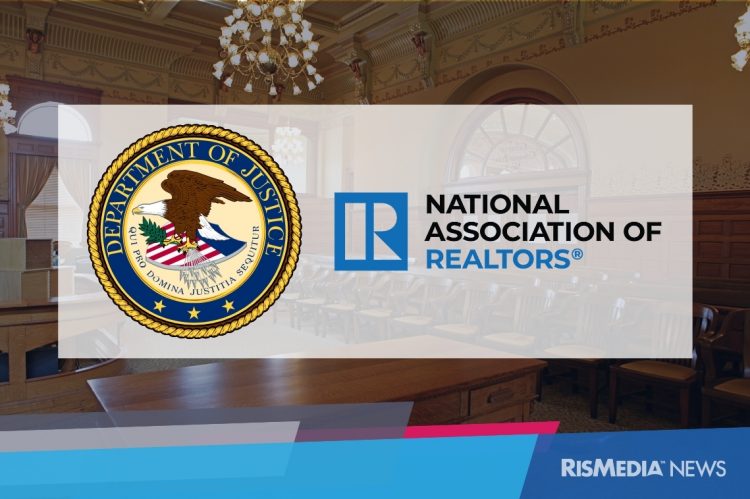The Department of Justice (DOJ) Antitrust Division appears committed to pushing forward with a long-running investigation into National Association of REALTORS®’ (NAR) policies, despite the looming transition to a new presidential administration, continuing to defend its inquiry all the way to the Supreme Court.
After sending a lawyer to speak at the final court hearing for NAR’s landmark settlement deal, the DOJ yesterday filed its first brief to the nation’s highest court, urging the justices to deny NAR’s request that they intervene and block the investigation.
“The court of appeals in this case determined that the government had made no commitment to refrain from reopening an antitrust investigation that the government had closed. That decision is correct, and it does not conflict with any decision of this Court or another court of appeals,” DOJ lawyers wrote.
Continuing to defend its investigation—which began more formally in 2018 and has carved a long and tumultuous path across the last six or so years—indicates that the DOJ wants to at least reserve the right to keep putting pressure on NAR under the upcoming Trump administration.
While it was under Trump that the DOJ originally agreed to “close” the inquiry, it is not at all clear whether a second Trump term would end it. Chris Bauer, the DOJ trial lawyer who attended the NAR settlement hearing, said specifically that the Antitrust Division sent out more civil subpoenas related to the investigation in May, but also admitted that the DOJ has “been investigating issues in the real estate space, including conduct by NAR, for decades.”
The Supreme Court represents a last attempt by NAR to prevent the DOJ from reopening its inquiry, which is focused on Clear Cooperation and “other rules,” and originally included more policies (many of which have since been modified or repealed). The DOJ admits it agreed to “close” the investigation in 2020 after negotiating with NAR, but in its brief, urges the Supreme Court to focus on supporting details.
According to the brief, the NAR asked the DOJ to commit to keeping the investigation closed for at least 10 years, which the DOJ declined to do.
“The (Antitrust) Division responded that it could not make ‘a commitment to not challenge (NAR’s) rules and policies in the future.’ The Division explained that it viewed such a commitment as ‘a nonstarter, especially in light of longstanding Department policies concerning settlements that affect future potential investigations,’” the brief says.
While NAR previously argued that allowing the DOJ to restart the inquiry set a bad precedent and could negatively affect trust in law enforcement in the future, the DOJ referred repeatedly back to the previous appellate court ruling, which focused on the “plain language” of the DOJ’s letter.
“(B)ased on the plain language and various other aspects of that agreement, the court held that the government had made no commitment to refrain from reopening the investigation in the first place,” the DOJ wrote.
It also spent time pushing back against some of the more technical legal arguments made by NAR, including that the agreement to close the investigation was an “illusory promise,” that the DOJ received favorable treatment and that the contract issues were improperly presented to the appeals court. NAR specifically claimed that the appeals court misapplied the “unmistakability principle,” a precedent that states contracts should not be viewed to “cede a sovereign right” of the United States government unless the government “unmistakably” waives that right.
“And (NAR’s) assertion that any ‘thumb on the scale’ should have favored petitioner, rather than the government, ignores the fact that (NAR) itself proposed the language of the first sentence of the closing letter,” the DOJ claimed.
At the highest level, NAR’s appeal to the Supreme Court would appear to be a long shot, with that court only taking up a tiny fraction of appeals, and mostly focusing on urgent legal questions or inconsistent rulings by lower courts. The DOJ, in its arguments, claimed that this case is a “poor” example of the kind of issues the Supreme Court focuses on.
“The (appellate court) decision…did not hold that ‘the United States enjoys greater rights than a private party to withdraw from a contract based solely on its determination that it no longer wishes to be bound by that contract,’” the DOJ argued. “That ‘narrow,’ case-specific holding does not implicate the question presented in the (NAR) petition.”
The investigation is only one aspect of the DOJ’s interest in real estate, with the NAR settlement serving as something like a second front. Judge Stephen R. Bough gave his final approval to the settlement last month, despite the DOJ’s explicit objections and threats that it could investigate antitrust conduct even if it was allowed—or mandated—under the deal.
Responding to Bauer’s concerns about buyer agreements at the settlement hearing last month, Ethan Glass, an attorney representing NAR, argued that the DOJ’s investigation and interventions could put NAR in a legally unwinnable position.
“If NAR is compelled under pain of contempt to require written buyer agreements, it can’t be that there is an investigation, a litigation, or anything by someone challenging NAR for doing that and circumventing this court’s order,” he said.













As an agent, I really don’t care what the outcome is at this point. The fact is the business will still be the same if you understand it inside and out and are client focused. This whole thing has blame on both ends. It’s good this happened though. It should leave the door open to investigate attorney practices. This country allows attorneys to do just about whatever they want. It’s time someone points some fingers at them. The amount of money they pull is insane. Plus, I would be shocked if you found one that has never lied under oath. Can’t tell me you believe all of your clients That industry needs to be put under the scope. I doubt the DOJ would take on that investigation.l since it makes too much sense and would effect them and their friends.
This is a bit confusing. Sounds like the Department of Justice wants to layer its own justice on the National Association of Realtors. As a member of NAR for 30 years I cannot think of a single benefit NAr has provided me. It is time to shut it down and end the lawsuits the coercion to be a member and the scandals at the home office.
agree
The simple system we had WORKED for years.
Now ; our government steps in again to muddy the waters for some unknown reason and causes chaos that hurts all parties: buyers, sellers and realtors.
Lawyers profit but all parties to a real estate transaction loose. The length of time to sell a property is much longer! Buyers don’t want confusing contracts with their agents that force them to pay their agent and have multiple contracts. The system we had was made simple for both buyers and sellers. All parties knew what to offer and counter offer with commission in mind. IT WORKED!
As a broker with 130 agents in Florida, if the dissolution of NAR ends some of these issues and allows our business to continue with less regulation, I am all for it. The Florida association of REALTORs provides plenty of coverage for education and organization and I agree: I see no value in NAR’s continued existence; certainly not $1.5 Billion in value not to mention the intrusive policies that appear to hold the weight of Federal Regulation, not possible except for the existence of NAR.